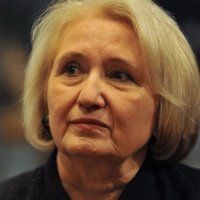The Haleh Esfandiari Forum: A Conversation with Ambassador Melanne Verveer
The Wilson Center hosted Ambassador Melanne Verveer, Executive Director of Georgetown Institute for Women, Peace, and Security (GIWPS) and former Ambassador for Global Women’s Issues. Ambassador Verveer spoke with Middle East Program Director Merissa Khurma about her experience in bringing awareness to women’s rights on the global stage, including through the pioneering Women, Peace, and Security Index, and the need for stakeholders at all levels to recognize the importance of empowering women. This discussion is part of the Haleh Esfandiari Forum, a joint initiative by the Middle East Program and Global Women’s Leadership Initiative to honor Dr. Esfandiari’s commitment to promoting women’s empowerment and her leadership of MEP from its inception in 1998 through 2015.
Women Peace and Security Index
The third edition of the Women Peace and Security Index, published by GIWPS and the PRIO Centre on Gender, Peace, and Security, draws on globally available data to assess women’s inclusion, justice, and security in 170 countries. While most global indices emphasize the measurement of inclusion, justice and security are two critical components of women’s chances for success. For example, “If a girl is able to go to school, but not secure in her classroom or her home, her degree [and] well-being is constructed,” Ambassador Verveer contended.
In this way, women’s empowerment is inextricably linked to countries’ economic growth and development. “We find a correlation between the well-being of women, and what that represents for prosperity [and] for peace, and conditions of women that are the polar opposite, and what that represents for instability, for conflict, and for an erosion of the standards that one wants to see,” Ambassador Verveer put forth. Therefore, an effective way strategy for engaging leaders is to demonstrate the enormous economic benefit that gender equality will bring.
A step back in women’s rights
The Covid-19 pandemic disproportionately impacted women, a trend that was seen globally. The unavailability of affordable childcare, and other burdens in the household, forced millions of women to forego paid employment; a lack of physical and social protection contributed to the alarming surges in violence against women; and, the obligation for girls to pursue an income over schooling will have irreversible implications for the next generation. Although, Ambassador Verveer contended these circumstances are the result of preexisting challenges that women faced. “[Covid-19] exposed the inequalities that women still find themselves contending with. Much of that disproportionate impact was the result and standard,” of pre-pandemic daily life for women.
Despite the obstacles women face, they have proven integral to the Covid-19 response and recovery. “This goes back to the strategic [thinking], the ways we have come to understand the important role women play in healthcare, the economy, education, and their families.” Therefore, while 2020 and 2021 saw devastating rollbacks in gender equality and women’s empowerment, it does provide an opportunity to reform existing legislation and social norms that continue to prevent women from exercising their rights and freedoms.
Progress across MENA
The Middle East and North Africa (MENA) region represents the largest gaps of any region in terms of countries ranked at the top and bottom. The United Arab Emirates is not only a regional but a global leader in women’s empowerment, ranked 24 in the 2021-22 index. Four of the ten lowest ranked countries, however, hail from the MENA region.
The UAE and Qatar have made impressive gains in women’s political representation and workforce participation, achieving, “inclusive progress that is recognized as important to the future of the [two] countries, whether it is on the global stage or seeing what difference it makes within the country.” In other countries that are slower to enact change, promoting women’s economic participation proves, “less threatening,” Verveer noted. Efforts to advance women entrepreneurs, such as lifting restrictions on their access to finance and domestic and foreign markets, is critical to their livelihood and countries’ economies.
Ambassador Verveer stressed the importance of involving everyone, including male allies and traditional and religious leaders, in campaigns for women’s empowerment. When women have access to leadership roles and are enabled to make a positive contribution to the economy and society, the entire population benefits. “[It’s] critical to unleash the talent, the potential, and the experiences of half of the population of the world… when we short-change women, we are short-changing society.” Therefore, investment in data-driven reform that engages a spectrum of stakeholders will accelerate gender equality.
Speakers


Introduction

Hosted By

Middle East Program
The Wilson Center’s Middle East Program serves as a crucial resource for the policymaking community and beyond, providing analyses and research that helps inform US foreign policymaking, stimulates public debate, and expands knowledge about issues in the wider Middle East and North Africa (MENA) region. Read more


Middle East Women's Initiative
The Middle East Women's Initiative (MEWI) promotes the empowerment of women in the region through an open and inclusive dialogue with women leaders from the Middle East and continuous research. Read more
